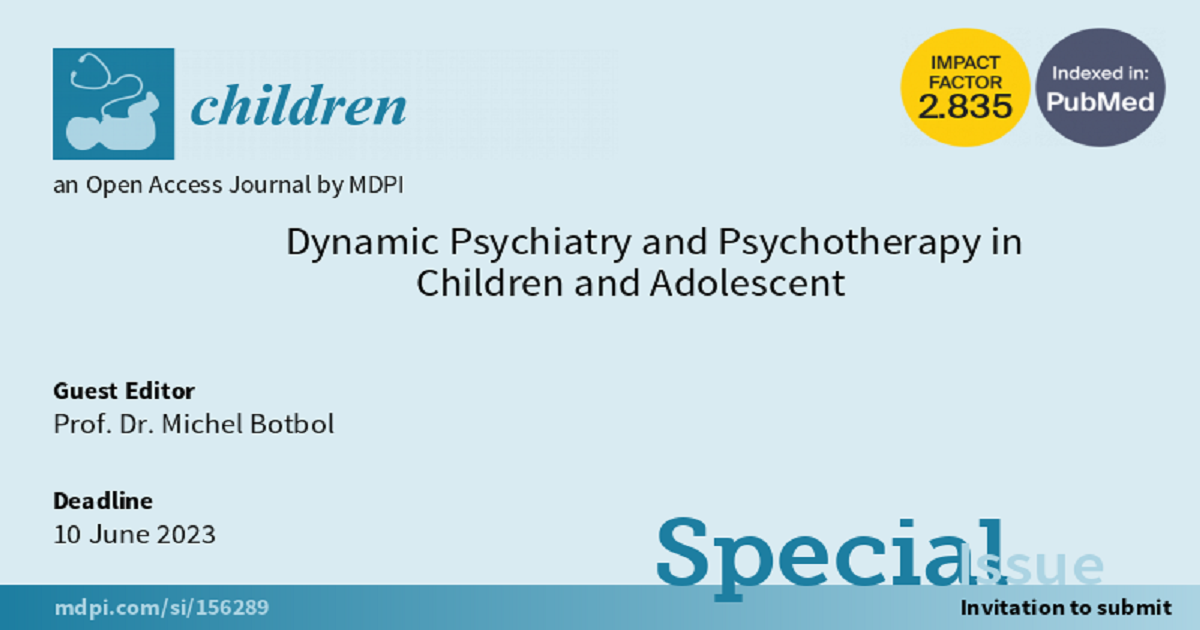Dynamic Psychiatry and Psychotherapy in Children and Adolescent
A special issue of Children (ISSN 2227-9067). This special issue belongs to the section "Child and Adolescent Psychiatry".
Deadline for manuscript submissions: closed (10 June 2023) | Viewed by 309

Special Issue Editor
Special Issue Information
Dear Colleagues,
Mental health disorders in children are generally defined as delays or disruptions in developing age-appropriate thinking, behaviors, social skills or emotion regulation. These problems are distressing for children and disrupt their ability to function well at home, in school or in other social situations.
Most mental disorders in children inducing symptoms impairing their relations to themselves or to others, such as neurodevelopmental disorders, anxiety disorders, major depressive disorder and other affective or dissociative disorders can be addressed by various forms of psychotherapy, including psychodynamic therapy, at least as adjunct treatment. There is evidence that psychotherapy is helpful for children with posttraumatic stress disorders and obsessive compulsive disorders, among others, and interpersonal psychotherapy (IPT) has been shown to help adolescents with depression. The value of family and group therapy for eating disorders in children and borderline personality disorders in adolescents continues to be widely accepted, and psychotherapy has evidence-based studies supporting its efficacy in the treatment of dysthymia, anxiety, panic disorders, and, in some cases, poorly controlled diabetes in adolescents.
More broadly, it is largely considered that all forms of psychotherapy provide children with at least some form of “corrective emotional experience” with the goal of alleviating a child’s problems that interfere in their psychological wellbeing. Therefore, we set up this Special Issue with the aim of collecting papers on mental disorders in children and the intervention of psychotherapy which could be helpful for them.
Prof. Dr. Michel Botbol
Guest Editor
Manuscript Submission Information
Manuscripts should be submitted online at www.mdpi.com by registering and logging in to this website. Once you are registered, click here to go to the submission form. Manuscripts can be submitted until the deadline. All submissions that pass pre-check are peer-reviewed. Accepted papers will be published continuously in the journal (as soon as accepted) and will be listed together on the special issue website. Research articles, review articles as well as short communications are invited. For planned papers, a title and short abstract (about 100 words) can be sent to the Editorial Office for announcement on this website.
Submitted manuscripts should not have been published previously, nor be under consideration for publication elsewhere (except conference proceedings papers). All manuscripts are thoroughly refereed through a single-blind peer-review process. A guide for authors and other relevant information for submission of manuscripts is available on the Instructions for Authors page. Children is an international peer-reviewed open access monthly journal published by MDPI.
Please visit the Instructions for Authors page before submitting a manuscript. The Article Processing Charge (APC) for publication in this open access journal is 2400 CHF (Swiss Francs). Submitted papers should be well formatted and use good English. Authors may use MDPI's English editing service prior to publication or during author revisions.
Keywords
- mental disorders in children and adolescents
- psychiatric disorders in children and adolescents
- anxiety
- depression
- neurodevelopmental disorders
- child and adolescent psychotherapies
- psychodynamic therapy in children and adolescents
- interpersonal psychotherapy
- family therapy






